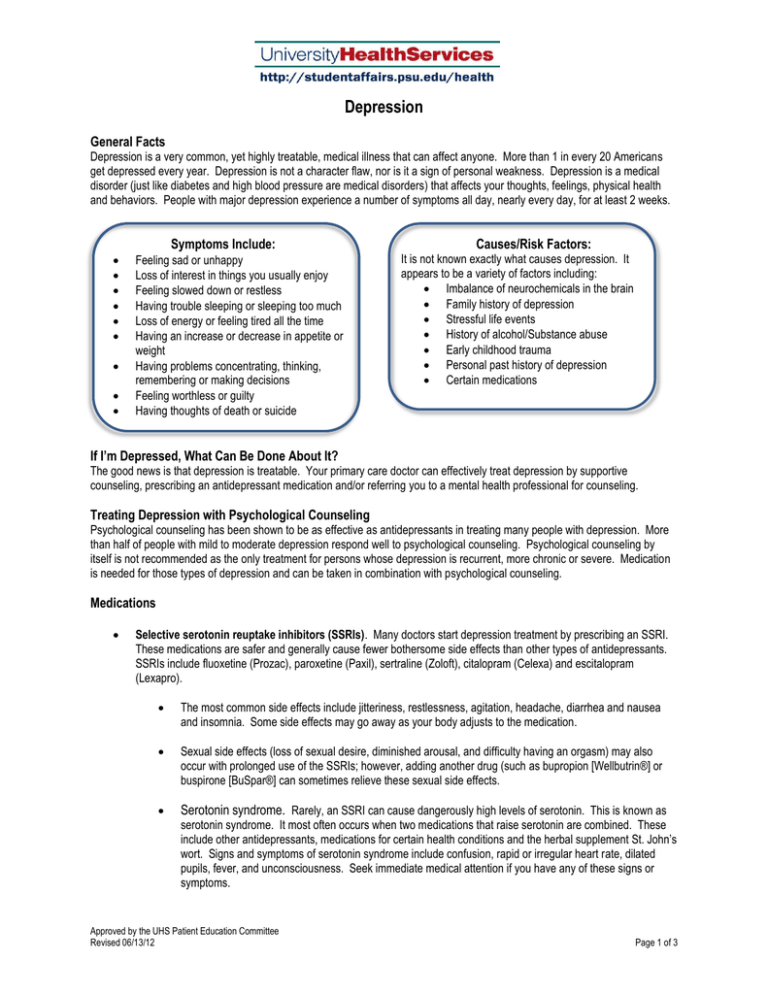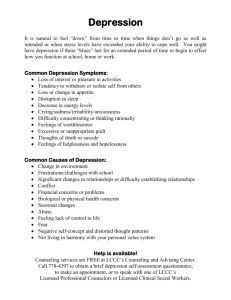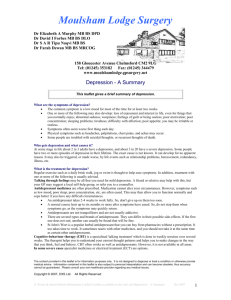
Depression
General Facts
Depression is a very common, yet highly treatable, medical illness that can affect anyone. More than 1 in every 20 Americans
get depressed every year. Depression is not a character flaw, nor is it a sign of personal weakness. Depression is a medical
disorder (just like diabetes and high blood pressure are medical disorders) that affects your thoughts, feelings, physical health
and behaviors. People with major depression experience a number of symptoms all day, nearly every day, for at least 2 weeks.
Symptoms Include:
Feeling sad or unhappy
Loss of interest in things you usually enjoy
Feeling slowed down or restless
Having trouble sleeping or sleeping too much
Loss of energy or feeling tired all the time
Having an increase or decrease in appetite or
weight
Having problems concentrating, thinking,
remembering or making decisions
Feeling worthless or guilty
Having thoughts of death or suicide
Causes/Risk Factors:
It is not known exactly what causes depression. It
appears to be a variety of factors including:
Imbalance of neurochemicals in the brain
Family history of depression
Stressful life events
History of alcohol/Substance abuse
Early childhood trauma
Personal past history of depression
Certain medications
If I’m Depressed, What Can Be Done About It?
The good news is that depression is treatable. Your primary care doctor can effectively treat depression by supportive
counseling, prescribing an antidepressant medication and/or referring you to a mental health professional for counseling.
Treating Depression with Psychological Counseling
Psychological counseling has been shown to be as effective as antidepressants in treating many people with depression. More
than half of people with mild to moderate depression respond well to psychological counseling. Psychological counseling by
itself is not recommended as the only treatment for persons whose depression is recurrent, more chronic or severe. Medication
is needed for those types of depression and can be taken in combination with psychological counseling.
Medications
Selective serotonin reuptake inhibitors (SSRIs). Many doctors start depression treatment by prescribing an SSRI.
These medications are safer and generally cause fewer bothersome side effects than other types of antidepressants.
SSRIs include fluoxetine (Prozac), paroxetine (Paxil), sertraline (Zoloft), citalopram (Celexa) and escitalopram
(Lexapro).
The most common side effects include jitteriness, restlessness, agitation, headache, diarrhea and nausea
and insomnia. Some side effects may go away as your body adjusts to the medication.
Sexual side effects (loss of sexual desire, diminished arousal, and difficulty having an orgasm) may also
occur with prolonged use of the SSRIs; however, adding another drug (such as bupropion [Wellbutrin®] or
buspirone [BuSpar®] can sometimes relieve these sexual side effects.
Serotonin syndrome. Rarely, an SSRI can cause dangerously high levels of serotonin. This is known as
serotonin syndrome. It most often occurs when two medications that raise serotonin are combined. These
include other antidepressants, medications for certain health conditions and the herbal supplement St. John’s
wort. Signs and symptoms of serotonin syndrome include confusion, rapid or irregular heart rate, dilated
pupils, fever, and unconsciousness. Seek immediate medical attention if you have any of these signs or
symptoms.
Approved by the UHS Patient Education Committee
Revised 06/13/12
Page 1 of 3
Depression
Serotonin and norepinephrine reuptake inhibitors (SNRIs). These medications include duloxetine (Cymbalta),
venlafaxine (Effexor XR) and desvenlafaxine (Pristiq).
Common side effects include nausea, dizziness, insomnia, sedation, and constipation. Rarely, these drugs
also cause increased sweating. People taking venlafaxine should have regular blood pressure checks, since
it may cause blood pressure to rise.
Norepinephrine and dopamine reuptake inhibitors (NDRIs). Bupropion (Wellbutrin) is in this category. Bupropion
has few side effects, but it has been associated with seizures in people with eating disorders; it is not recommended for
people who have bulimia or anorexia. The drug carries a small risk of seizures in other people as well. Other side
effects of bupropion may include mild anxiety or insomnia and decreased appetite with weight loss. Unlike other
antidepressants, bupropion does not have sexual side effects. It is sometimes used at low doses to help counter the
sexual side effects of other antidepressants.
Other medication strategies. Your doctor may suggest other medications to treat your depression. In some cases,
your doctor may recommend combining two or more antidepressants or other medications for better effect.
Important Antidepressant Facts:
The Food and Drug Administration (FDA) requires that all antidepressants carry a warning that some children,
adolescents and young adults may be at increased risk of suicide when taking antidepressants. Anyone taking an
antidepressant should be watched closely for worsening depression or unusual behavior – especially in the first few
weeks after starting an antidepressant. Keep in mind, antidepressants are more likely to reduce suicide risk in the long
run by improving mood.
Antidepressants only work if taken every day.
Antidepressants are not addictive.
Benefits from medication appear slowly. Full effects are not usually seen until 4-6 weeks of treatment are complete.
Continue antidepressants even after you feel better.
Most medications are taken for at least 6-12 months.
Mild side effects are common and usually improve with time.
If you’re thinking about stopping the medication, call your clinician first. Some medications may cause a
discontinuation syndrome if not tapered slowly. Symptoms may include dizziness, nausea, headache, fatigue, muscle
aches, chills, anxiety and irritability.
The goal of treatment is complete remission. Sometimes it takes a few tries.
Lifestyle Measures:
Stay physically active – Make sure you make time to address your basic physical needs, for example, walking for a
certain amount of time each day.
Make time for pleasurable activities – Even though you may not feel as motivated, or get the same amount of
pleasure as you used to, commit to scheduling some fun activity each day – for example, doing a hobby, listening to
music or watching a video.
Spend time with people who can support you – It’s easy to avoid contact with people when you’re depressed, but
you need the support of friends and loved ones. Explain to them how you feel, if you can. If you can’t talk about it,
that’s OK – just ask them to be with you, maybe accompanying you on one of your activities.
Practice relaxing – For many people, the changes that come with depression – no longer keeping up with our usual
activities and responsibilities, feeling increasingly sad and hopeless – leads to anxiety. Since physical relaxation can
lead to mental relaxation, practicing relaxation is another way to help yourself. Try deep breathing, or a warm bath, or
just finding a quiet, comfortable, peaceful place and saying comforting things to yourself (like “it’s OK”).
Approved by the UHS Patient Education Committee
Revised 06/13/12
Page 2 of 3
Depression
Simple goals and small steps – It’s easy to feel overwhelmed when you’re depressed. Some problems and
decisions can be delayed, but others cannot. It can be hard to deal with them when you’re feeling sad, have little
energy, and not thinking clearly. Try breaking things down into small steps. Give yourself credit for each step you
accomplish.
CAN HELP 1-800-643-5432 is the community’s 24-hour crisis service.
In an emergency go to Mount Nittany Medical Center or call 911 for an ambulance.
Test Results and Advice Nurse
Send secure message to advice nurse via the UHS website or call 814- 863-4463.
Appointments
Appointments can be made online via the UHS website, by phone 814-863-0774, or in person. If you are unable to keep your
appointment, please call or go online to cancel. Otherwise you will be charged for the visit.
This content is reviewed periodically and is subject to change as new health information becomes available. This information is intended to
inform and educate and is not a replacement for medical evaluation, advice, diagnosis or treatment by a healthcare professional.
Approved by the UHS Patient Education Committee
Revised 06/13/12
Page 3 of 3






